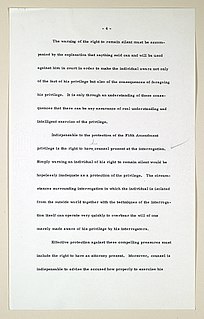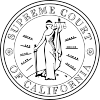
In the United States, the Miranda warning is a type of notification customarily given by police to criminal suspects in police custody advising them of their right to silence; that is, their right to refuse to answer questions or provide information to law enforcement or other officials. These rights are often referred to as Miranda rights. The purpose of such notification is to preserve the admissibility of their statements made during custodial interrogation in later criminal proceedings.
Gideon v. Wainwright, 372 U.S. 335 (1963), was a landmark U.S. Supreme Court decision in which the Court ruled that the Sixth Amendment of the U.S. Constitution requires U.S. states to provide attorneys to criminal defendants who are unable to afford their own. The case extended the right to counsel, which had been found under the Fifth and Sixth Amendments to impose requirements on the federal government, by imposing those requirements upon the states as well.
In American procedural law, a continuance is the postponement of a hearing, trial, or other scheduled court proceeding at the request of either or both parties in the dispute, or by the judge sua sponte. In response to delays in bringing cases to trial, some states have adopted "fast-track" rules that sharply limit the ability of judges to grant continuances. However, a motion for continuance may be granted when necessitated by unforeseeable events, or for other reasonable cause articulated by the movant, especially when the court deems it necessary and prudent in the "interest of justice."
Right to counsel means a defendant has a right to have the assistance of counsel and, if the defendant cannot afford a lawyer, requires that the government appoint one or pay the defendant's legal expenses. The right to counsel is generally regarded as a constituent of the right to a fair trial. Historically, however, not all countries have always recognized the right to counsel. The right is often included in national constitutions. Of the 194 constitutions currently in force, 153 have language to this effect.
Faretta v. California, 422 U.S. 806 (1975), was a case in which the Supreme Court of the United States held that criminal defendants have a constitutional right to refuse counsel and represent themselves in state criminal proceedings.
Strickland v. Washington, 466 U.S. 668 (1984), was a landmark Supreme Court case that established the standard for determining when a criminal defendant's Sixth Amendment right to counsel is violated by that counsel's inadequate performance.
Godinez v. Moran, 509 U.S. 389 (1993), was a landmark decision in which the U.S. Supreme Court ruled that if a defendant was competent to stand trial, they were automatically competent to plead guilty, and thereby waive the panoply of trial rights, including the right to counsel.
McKaskle v. Wiggins, 465 U.S. 168 (1984), is a United States Supreme Court case in which the court considered the role of standby counsel in a criminal trial where the defendant conducted his own defense. In this case the defendant claimed his Sixth Amendment right to present his own case in a criminal trial was violated by the presence of a court-appointed standby counsel.
Douglas v. California, 372 U.S. 353 (1963), was a case before the United States Supreme Court.
Martinez v. Court of Appeal of California, 528 U.S. 152 (2000), is a United States Supreme Court case in which the Court decided an appellant who was the defendant in a criminal case cannot refuse the assistance of counsel on direct appeals. This case is in contrast to Faretta v. California, 422 U.S. 806 (1975), which grants criminal defendants the right to refuse counsel for trial purposes.
Anders v. California, 386 U.S. 738 (1967), was a United States Supreme Court case in which a court-appointed attorney filed a motion to withdraw from the appeal of a criminal case because of his belief that any grounds for appeal were frivolous.
A Marsden motion is the only means by which a criminal defendant can fire a court-appointed attorney or communicate directly with a judge in a California state court. It is based on a defendant's claim that the attorney is providing ineffective assistance or has a conflict with the defendant. The name comes from the case People v. Marsden. A defendant is required to know to make a challenge of ineffective assistance of counsel, and make one, or the claim of ineffective assistance of counsel or the issue cannot be raised on appeal. There is no requirement to notify a defendant of such a requirement.
The Assistance of Counsel Clause of the Sixth Amendment to the United States Constitution provides: "In all criminal prosecutions, the accused shall enjoy the right...to have the Assistance of Counsel for his defence."
People v. Newton, 8 Cal. App. 3d 359, was a controversial appeal arising from the voluntary manslaughter conviction of Huey P. Newton, the reputed co-founder of the Black Panther Party for Self Defense. The California Court of Appeal reversed Newton's conviction due to prejudicial error stemming from the trial court's failure to instruct the jury as to the possibility of involuntary unconsciousness as a complete defense to the charges. Though Newton's attorney arguably withdrew the defense at trial, the Court nonetheless held that the failure to instruct violated Newton's constitutional right to have the jury determine all material issues based on the evidence. This case stands for the proposition that trial courts have an affirmative duty to instruct juries as to a defense of involuntary unconsciousness where there exists evidence that may support that conclusion.
Taylor v. Illinois, 484 U.S. 400 (1988), is a United States Supreme Court decision in which the Court held that defense witnesses can be prevented from testifying under certain circumstances, even if that hurts the defense's case. Taylor was the first case to hold that there is no absolute bar to blocking the testimony of a surprise witness, even if that is an essential witness for the defendant, a limitation of the broad right to present a defense recognized in Washington v. Texas (1967).
In the United States, a public defender is an attorney-at-law appointed by the courts and provided by the state or federal governments to represent and advise those who cannot afford to hire a private attorney. Public defenders are full-time attorneys employed by the state or federal governments. The public defender program is one of several types of criminal legal aid in the United States.
Pointer v. Texas, 380 U.S. 400 (1965), was a decision by the United States Supreme Court involving the application of the right of to confront accusers in state court proceedings. The Sixth Amendment in the Bill of Rights states that, in criminal prosecutions, the defendant has a right "...to be confronted with the witnesses against him; to have compulsory process for obtaining witnesses in his favor..." In this case, a person arrested in Texas for robbery was deprived of the ability to cross-examine a witness when the lower court allowed the introduction of a transcript of that witness's earlier testimony at a preliminary proceeding instead of compelling attendance by the witness at trial.
As one of the fifty states of the United States, California follows common law criminal procedure. The principal source of law for California criminal procedure is the California Penal Code, Part 2, "Of Criminal Procedure."
Kimmelman v. Morrison, 477 U.S. 365 (1986), was a decision of the U.S. Supreme Court that clarified the relationship of the right to effective assistance of counsel under the Sixth Amendment to other constitutional rights in criminal procedure. In this case, evidence against the defendant was probably seized illegally, violating the Fourth Amendment, but he lost the chance to argue that point due to his lawyer's ineffectiveness. The prosecution argued that the defendant's attempt to make a Sixth Amendment argument via a habeas corpus petition was really a way to sneak his Fourth Amendment argument in through the back door. The Court unanimously disagreed, and held that the Fourth Amendment issue and the Sixth Amendment issue represented different constitutional values, and had different requirements for prevailing in court, and therefore were to be treated separately by rules of procedure. Therefore, the habeas corpus petition could go forward. In its opinion, the Court also gave guidance on how to apply its decisions in Stone v. Powell and Strickland v. Washington.
Iowa v. Tovar, 541 U.S. 77 (2004), was a unanimous decision of the Supreme Court of the United States that clarified how well-informed a defendant had to be to waive their right to counsel under the Sixth Amendment. The defendant in this case had waived his right to counsel and pled guilty to drunk driving, and then had been convicted of drunk driving twice more, with sentences increasing as his convictions piled up. He argued that the judge in the first case had not explained that multiple drunk driving convictions would lead to more severe sentences, so his waiver of counsel had been invalid. The Supreme Court disagreed, saying that the judge's warnings had been adequate, and the defendants' waiver was "knowing, voluntary, and intelligent."

